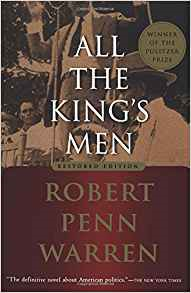
It’s probably a dangerous act to review a Pulitzer Prize winning book. But that’s what I’m going to do. Some years ago my son gave me a copy of All The King’s Men by Robert Penn Warren. Published in 1946, it won the Pulitzer in 1947, and was made into a movie in 1949 and again in 2006. I haven’t seen either movie.
Alas, I didn’t like the book. I would almost say I hated it, but that would be too strong. If I were going to review it on Amazon, I’d rate it only 2-stars.
Sacrilege! This book was judged by a panel of experts to be the best novel in 1946. On the back cover of the copy I have, it says many judge it to be the best novel ever on American politics.
Maybe so, but that doesn’t mean I have to like it. The book opens in a very complicated manner. Jack Burden, the protagonist, is working for someone called “Boss.” We learn Boss is the governor of the unnamed Southern state, Willie Stark. Willie was a small town lawyer who became governor. They are being driven by a driver called Sugar Boy, a stutterer who seems to be uneducated, but can drive fast and expertly. The present in the book is sometime during the Great Depression, when Willie is somewhere beyond his first term as governor. Those in know say Willie Stark is patterned after Huey Long, once governor of Louisiana. What I know about Long, I can see that in Stark.
Herein lies my biggest problem with the book. What is the time frame? It starts in one year, jumps back to some time I could never figure out, jumps forward but not to the time it started at, jumps back again but not to where it did the first time. By the end of the first chapter, which is at least 60 pages long (as are all the chapters in the 650 page book), I was so confused I set it aside, not sure if I would pick it up and read it or not.
In the author’s defense, I must say that I often read in distracting circumstances, and I did so for most of this book. The TV is on. The phone rings, and even if it doesn’t produce a conversation, it takes me out of the reading for a short while. People are wanting my time, I have a to-do list that’s so long I know I shouldn’t be reading, etc. But that first chapter…I felt as if I was on a rollercoaster, or the Wildcat back at Rocky Point Park, a ride I hated—and never rode it again after the first time. As an author, I understand how flashbacks are effective, and flash forwards are too. But backwards—half-forwards—half-backward—somewhere I don’t know where…well, this just leaves me with whiplash, and a queasy stomach.
This was especially so because of the long chapters. I can’t dedicate a large enough chunk of time to reading to read a 60 or 70 page chapter in one sitting. I’m lucky to get 10 pages done, and I usually set that as an evening’s goal. But with the first ten pages leaving me hopelessly confused, the next ten pages not clarifying anything, and the third ten leaving me wondering why I was reading it, it’s a wonder I kept on.
Often, when I finish a book, I go back and reread the first chapter. I’ve found that authors often have clues in the first chapter as to what will come. Or, something confusing in the first chapter will have been clarified later, and by re-reading it I have a better understanding of the book as a whole. I should probably do that with this one: if not the whole first chapter, at least the first twenty or thirty pages. But, I don’t think I have the strength.
I appreciate the gift of this book, but it’s not a keeper. Before I toss it into the garage sale pile, I’ll check with my son to see if he wants it back. If not, goodbye Willie and Jack. Goodbye Sugar Boy, and love interest Ann Stanton. I’d like to say it’s been good knowing you, that I was entertained and enlightened by your antics. But I wasn’t.